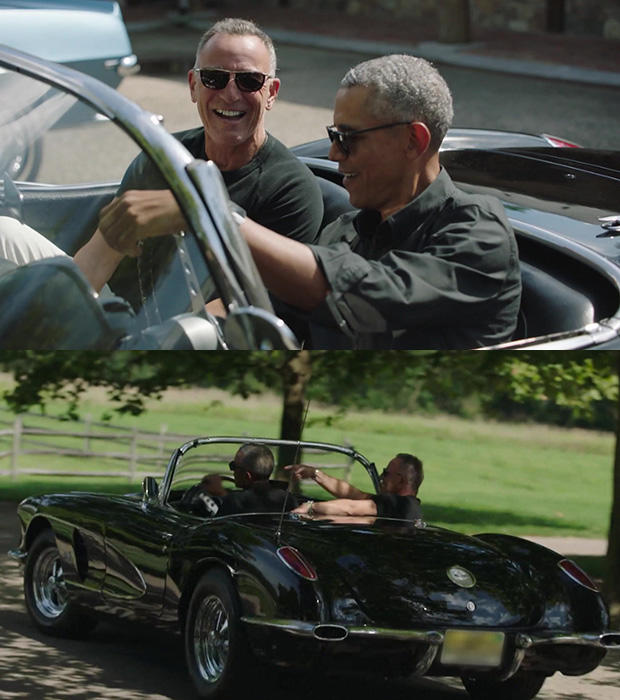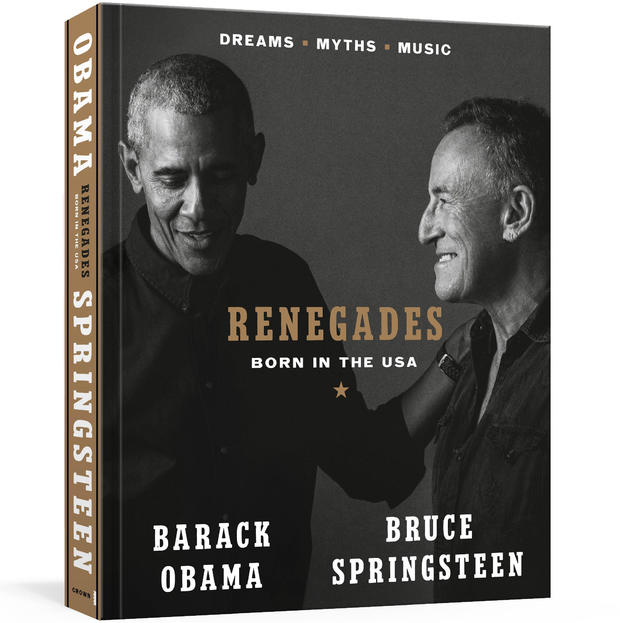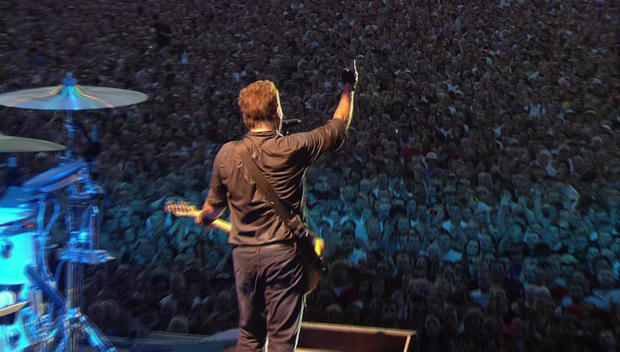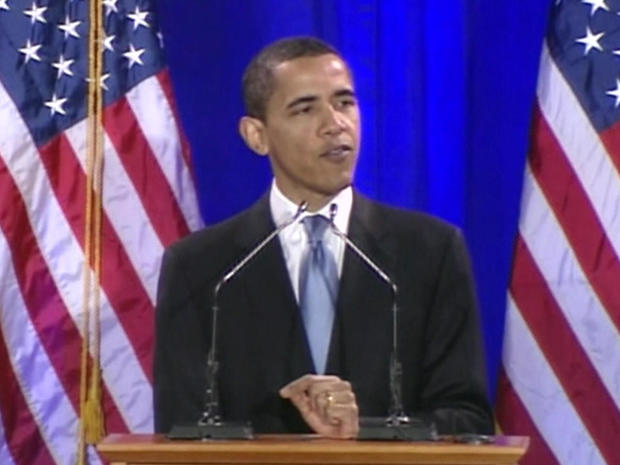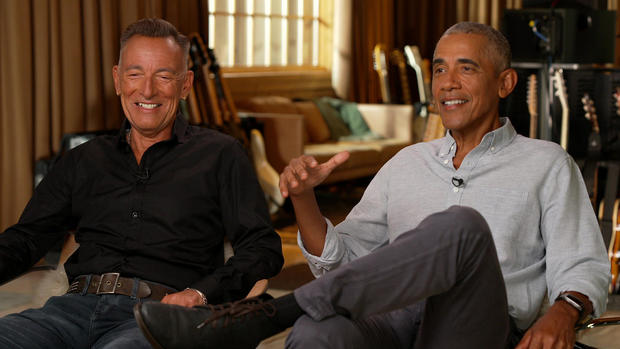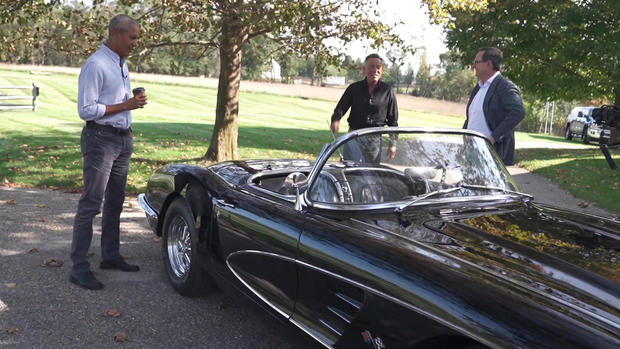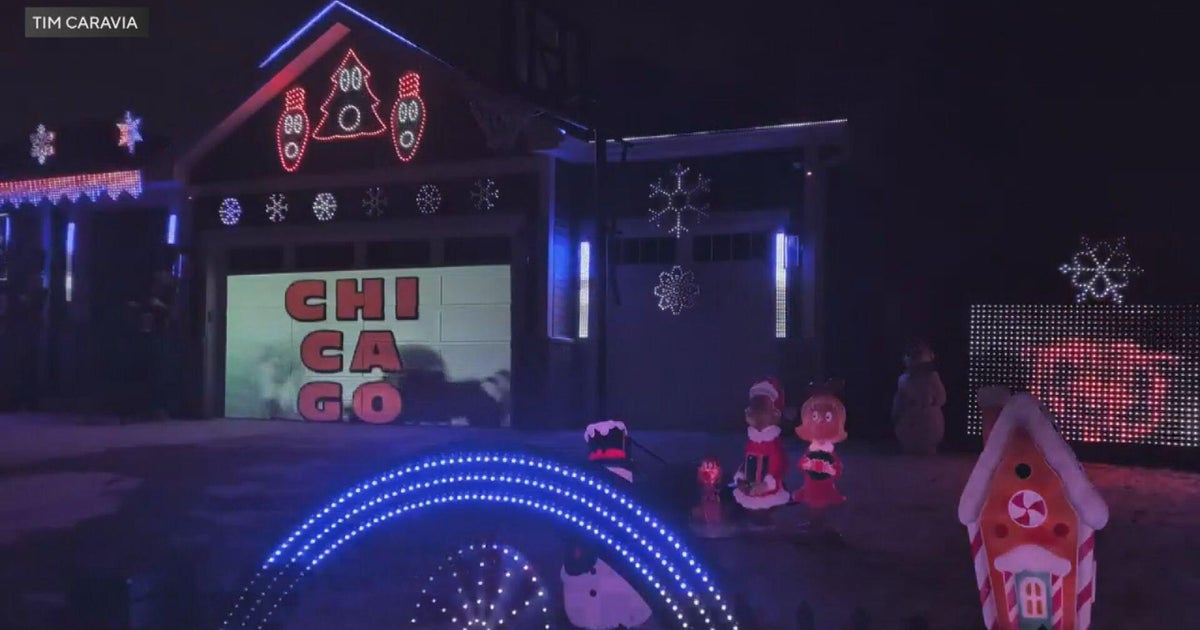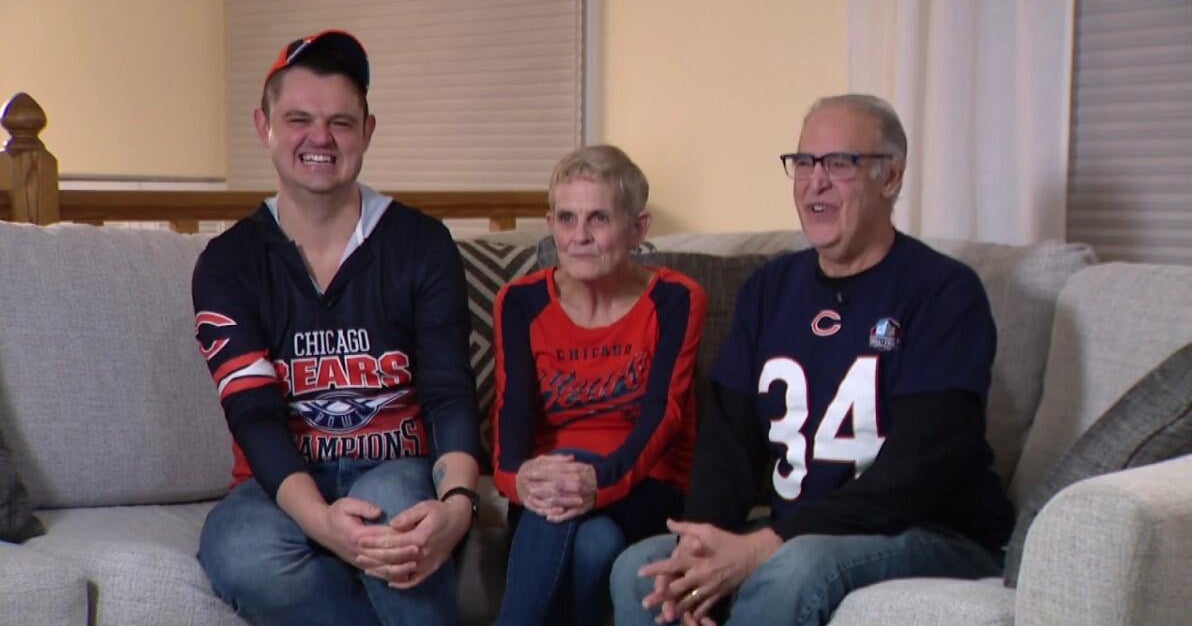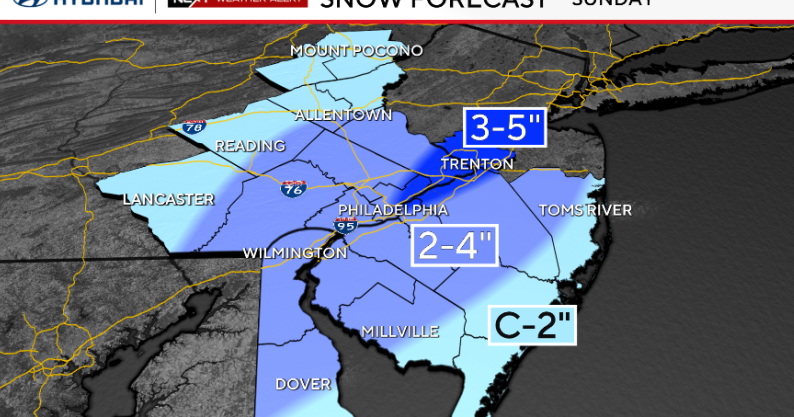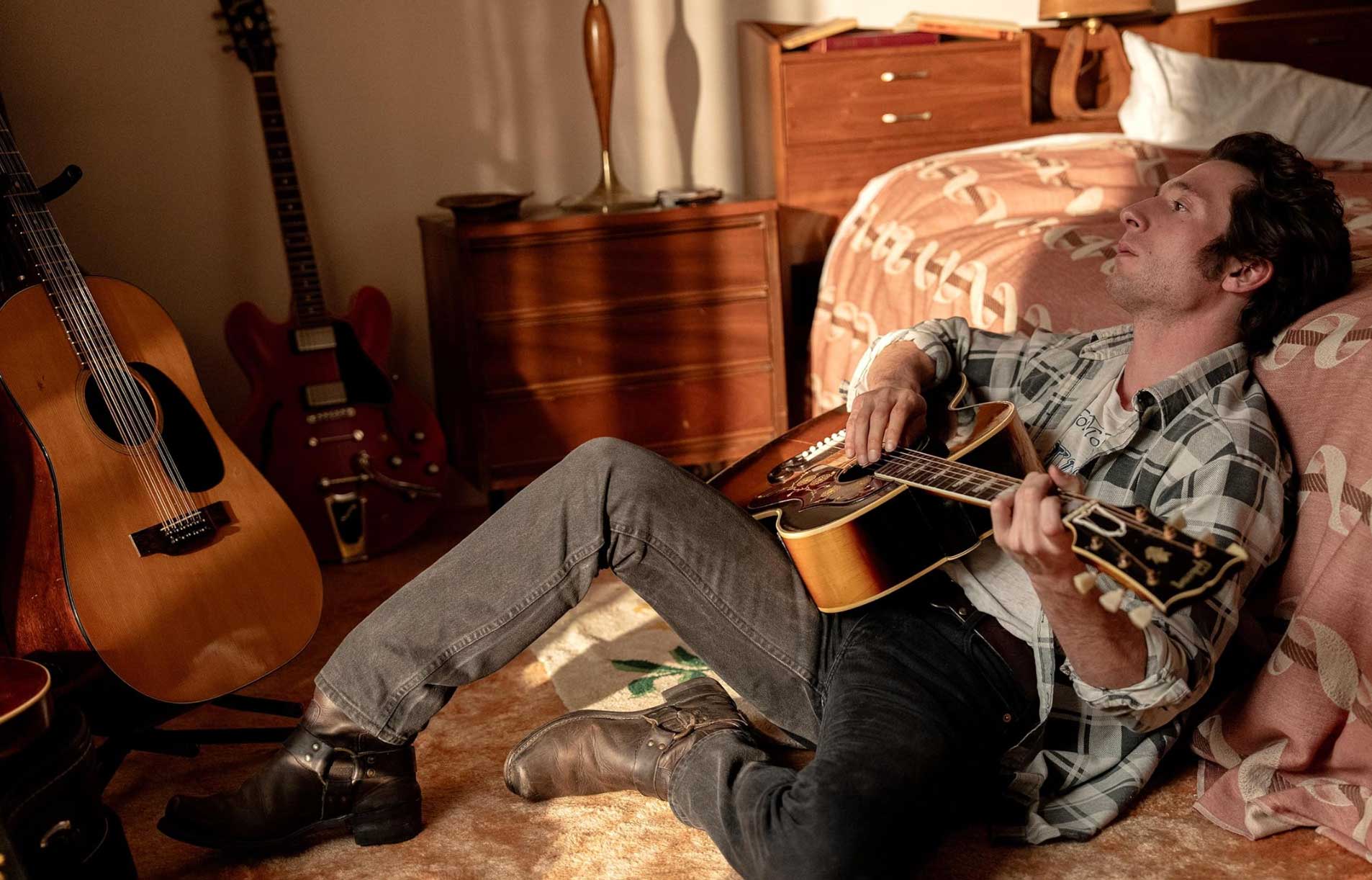Barack Obama and Bruce Springsteen: Renegades
A rock star and a former president hitting the road – if it looks like a buddy movie, well, it's kind of become one.
Driving a 1960 Corvette at the home of singer-songwriter Bruce Springsteen was, said former President Barack Obama, "one of the highlights of my time on this farm ... getting behind the wheel of this mean machine!"
Correspondent Anthony Mason asked Springsteen, "How old were you when you got this?"
"Twenty-five."
"And what did this mean to your life when you bought it?"
"Everything!" he replied. "Because it was all I got out of my record deal when I was 25 years old, was this car, and I got a piano."
Mr. Obama said, "I will confess that the Secret Service, normally I'm good about alerting them, but …"
"You just took off?" Mason asked.
"Yeah, I just took off, and in the rearview mirror I could see some of my agents running behind!" he laughed.
The friendship between the two men started in 2008: "Bruce Springsteen decided to charitably help out some not-very-well-known new U.S. senator who had the audacity to run for president," Mr. Obama said.
Over time, that friendship deepened, a friendship Mr. Obama once characterized like so: "I am the President. He is the Boss."
And last year, they sat down together for a couple of days at Springsteen's New Jersey farm to talk about their lives, and our world.
Those conversations became a podcast, and now a book: "Renegades: Born in the USA" (Crown).
Mason said, "You describe the two of you as 'a little sympatico.'"
"I think Bruce, through his music, I tease him about how much better it is being a rock 'n' roll star than being a politician," Mr. Obama said.
"Which of course it is!" Springsteen laughed.
"You do have the better deal," Mason said.
"He does not really deny it!" Mr. Obama said. "There is a certain sense of ministry to Bruce's music. And his body of work is around these issues of, you know, 'Who are we?'"
Springsteen said, "That's the question."
Like a minister, Springsteen exhorts concertgoers with language of a kind of faith: "We came here tonight because we want to build a house. … And when we build that house, we're gonna use the bare wood, and we're going to use the Good News that's here tonight."
Springsteen told Mason, "What I do on any given evening when I'm doing my job well is, I create a space of common values and shared narrative. For three hours, we create that place. It exists somewhere."
Mr. Obama added, "And that power of storytelling is, you know, at its best, what good politics does as well, right? It says, 'Here's who we are. Here's a common story we share.'"
As presidential candidate Obama said in Philadelphia on March 18, 2008: "I have brothers, sisters, nieces, nephews, uncles and cousins, of every race and every hue, scattered across three continents, and for as long as I live, I will never forget that in no other country on Earth is my story even possible."
"You get a lot of nostalgia sometimes for '50s and 'Leave It to Beaver' and picket fences," Mr. Obama told Mason. "And that was a genuine shared story, except it left a whole bunch of stuff out."
"And a lot of people."
"People like me got left out. I think where Bruce and I sort of overlap is that sense of, it was necessary to revise the story to make it inclusive."
Springsteen said, "People have got to recognize the country for what it is – its faults, its blessings."
Mason asked, "One thing that's interesting: I think a lot of people would look at this and go, 'What's a guy from Hawaii and a guy from New Jersey, Black guy, White guy, what have they got in common?' You both see yourselves as outsiders. You talk about feeling invisible."
"Well, sure, yeah," Springsteen said. "It might be the story of all artists and musicians, that you start from the outside. When I was young, I felt voiceless. I felt invisible. But I fought to find out where I belong."
Mr. Obama said, "I joked with Bruce. I said, 'Well, I don't understand why a kid from New Jersey thinks he's an outsider.' 'Cause, now, I'm an outsider! You know, you can definitely understand why Barack Obama is the outsider. What I do think we both shared was that sense of having questions about, 'Well, how do we fit into the existing narrative? How do we fit into the communities that we're born into?' Partly because, Bruce, you've talked about your dad being sick. My dad was absent."
"Well, you both talk about having essentially absentee fathers," Mason said.
"Yeah," Springsteen replied.
"And I think that can contribute to that sense of feeling, like, 'I don't know exactly how I'm supposed to behave or how I'm supposed to act,'" Mr. Obama added.
"Well, let me ask you this: You said something in the podcast, Bruce, that really struck me, which was that in many ways your work was really about your father?"
"The more I look back on it, the more that's the conclusion I come to," he replied.
"What were you doing in that?"
"Well, in a sense I tried to be him," Springsteen said. "I tried to create a physical self that I thought he would approve of, and have the success that I thought he would approve of. But I also felt a certain sort of … that I was an instrument of revenge for the disappointments that my father had in his life. And so, I started to intensely tell these working-class stories that were filled with both hope and compassion, but a lot of anger also. And I think Barack had a very similar, I mean, why did you become president? Who were you trying to impress?"
Mason said, "Well, that was my next question. Do you think in some ways your father's absence drove your ambition?"
"Absolutely," Mr. Obama replied. "Yeah, my father was absent. He left when I was two. I met him only once. I knew him for about a month."
"That's interesting how influential that month turned out to be."
"Well, that's right. I mean, I wrote a whole book called 'Dreams From My Father,' a guy I didn't know."
In their podcast conversations, they touched on some tough subjects. When Mr. Obama asked, "How unusual was it to have an integrated band back in the day?" Springsteen replied, "I think … Why is it so hard to talk about race? … Why am I pausing here?"
For years, Springsteen's E Street Band featured Clarence Clemons, who died in 2011. The chemistry between "the Big Man" and "The Boss" is immortalized in newly-restored footage of Springsteen's performance at the No Nukes Concert in 1979:
Mason asked, "You say in the podcast and the book that in many ways the most important story you ever told was you and Clarence on the stage together."
"It was not intellectual; it was emotional, it was the language of the heart," Springsteen said. "But it was incredibly visual, it was more valuable than the stories I wrote in my music, you know?"
Mr. Obama said, "In an ideal world, what Bruce and Clarence portrayed on stage was essentially a reconciliation, right? And redemption. But most of your audiences were primarily White. And they can love Clarence when he's on stage, but if they ran into him in a bar, suddenly the N-word comes out."
"Yeah."
"And part of Bruce's music, and part of my politics, has been, 'No, no. You gotta surface that stuff. You gotta talk about it.' Sunlight is the disinfectant. And if you talk about it, then you can reconcile in a true way, not in a phony way, but in a real way."
Mason asked, "As we speak, you're headed to Virginia soon to campaign [for Democratic gubernatorial candidate Terry McAuliffe]. Looking a year forward, how are you feeling about the midterms and how the president is doing?"
"Well, look, I think Joe Biden is pursuing the exact policies that need to be pursued," Mr. Obama replied. "Has he been able to bridge the polarization that we've seen building up over several decades now? No. And in fairness to him, I wasn't able to slow that down as much as I would have liked, and certainly my successor, you know, actively promoted it. We're gonna have to figure out, how do we regain some sense of a common American story? And I think that is gonna be a longer-term project. I think that's a 10-, 20-year project."
"It's generational," Springsteen said.
"It's a generational process. The good news is that I think there is more of a common story among young people. But the older folks like us, we gotta get out of the way!" Mr. Obama laughed.
"Yeah, there's no going back," Springsteen said. "We can be momentarily polarized. But at the end of the day, history's movin' on."
And surprising things can happen: Just look at the friendship of Barack Obama and Bruce Springsteen.
The 72-year-old rock star told Mason, "I think making friends as you get older, in the later parts of your life, is really rewarding. And it's a little bit rare."
"Comes from a different place, too, really," said Mason.
"That's right."
"And you don't want to end up being just a lonely old guy!" the 60-year-old former president laughed.
"Old man! That's right!"
"That's the thing we're trying to avoid, right?"
"Right."
Mr. Obama added, "It's been a hell of a ride."
Springsteen assented: "Life is good."
READ A BOOK EXCERPT: "Renegades: Born in the USA"
Don't miss part two of Anthony Mason's interview with former President Barack Obama and Bruce Springsteen on "CBS Mornings" Monday, October 25.
For more info:
- "Renegades: Born in the USA" (Podcast)
- "Renegades: Born in the USA" by Barack Obama and Bruce Spingsteen (Crown), in Hardcover and eBook formats, available October 26 via Amazon and Indiebound
- brucespringsteen.net
- barackobama.com
Story produced by Ed Forgotson and Rebecca Castagna. Editor: Ed Givnish.
